What is CMS (Content Management System) and Which One is Best
|
Getting your Trinity Audio player ready...
|
Whether you’re a small business owner, blogger, developer, or marketer, the term “CMS” has surely crossed your path. But if you’re still confused about what exactly a CMS is, how it works, and which one is right for your project, this detailed guide will simplify everything.
Table of Contents
ToggleWhat is a CMS?
CMS (Content Management System) is software that allows you to build and manage a website without having to write code from scratch.
Instead of editing HTML, CSS, or JavaScript manually, you use a graphical interface to create, update, and publish content. It separates the design (frontend) from the content (backend), so you can manage each easily.
How Does a CMS Work?
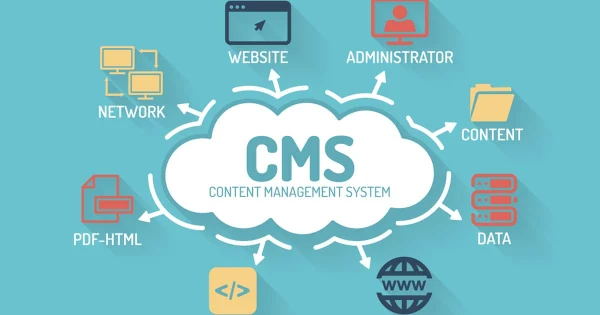
A CMS simplifies the process of managing a website by combining multiple systems that work together seamlessly. Here’s how each part functions:
1. Admin Dashboard
- Central control panel to manage your website
- Allows you to create pages, write blog posts, upload media, and edit content easily
- No coding required – ideal for beginners and content creators
2. Theme System
- Controls the look and feel of your website
- Offers pre-designed templates that you can customize
- Keeps design and content separate, so changes to one don’t affect the other
3. Plugins and Add-ons
- Extend your website’s features with additional tools
- Examples: Contact forms, SEO tools, live chat, image sliders
- Most CMS platforms offer thousands of free and premium plugins
4. Database Management
- Stores all your content, such as text, images, and user data
- Common databases: MySQL, MariaDB
- CMS fetches content from the database and displays it when someone visits your site.
5. User Roles and Permissions
- Define who can access and manage what
- Roles include Admin, Editor, Author, Subscriber, etc.
- Useful for teams or multi-author websites
When you hit “publish,” the CMS combines your content and design to display a complete webpage instantly.
Don’t Miss: Why Every Business Needs a Website in 2025
Key Features to Expect in a Good CMS
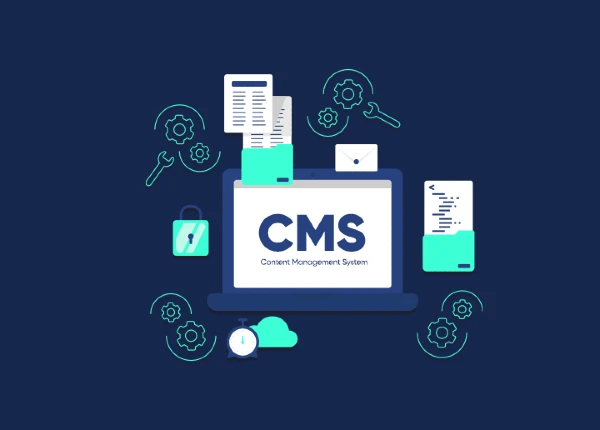
A powerful Content Management System (CMS) should offer flexibility, ease of use, and robust features to support content creation and site management. Below are the key features that define a good CMS:
1. WYSIWYG Editor (What You See Is What You Get)
This editor allows users to create and format content visually, just like using a word processor. It removes the need for coding and shows exactly how the content will look once published.
2. Drag-and-Drop Page Builder
An intuitive drag-and-drop interface helps users design web pages by simply moving elements like images, text blocks, and buttons. It simplifies layout building and is ideal for non-developers.
3. Media Uploads and Galleries
A good CMS should let users upload and manage images, videos, and other media files easily. It should also support creating image galleries and organising files for efficient access.
4. SEO Optimization Tools
Built-in SEO features like meta tag editing, custom URLs, and XML sitemap generation help improve the site’s visibility on search engines and attract more organic traffic.
5. Responsive Design Support
A modern CMS makes sure your website looks great and works smoothly on desktops, tablets, and mobiles – all without the need for additional coding.
6. Customizable Templates
Pre-built themes that can be customized allow users to control the look and feel of the site while maintaining a professional appearance.
7. Security and Backup Options
A reliable CMS offers features like regular data backups, malware protection, and secure login to safeguard website data.
8. Multi-User Access with Role Management
Multiple user roles—like Admin, Editor, or Contributor—allow for team collaboration with controlled access based on permissions.
Don’t Miss: How Much Does It Cost to Develop a Website in India? 2025 Pricing
Why Use a CMS?
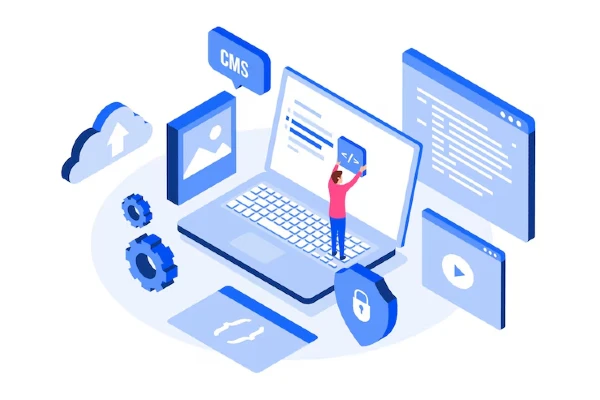
A Content Management System (CMS) serves as the foundation that powers most modern websites today. Whether you’re running a blog, business site, or eCommerce store, a CMS helps you build and manage your site efficiently without needing technical skills. Here’s why it’s the preferred choice:
1. Easy to Use: One of the major benefits of using a CMS is its ease of use. You don’t need to know coding or have technical expertise. Most CMS platforms come with an intuitive interface, making it simple to create pages, publish blogs, and update content in just a few clicks.
2. Time-Saving: With built-in templates and drag-and-drop builders, a CMS lets you build professional-looking websites quickly. You can launch and maintain your site without spending hours on manual coding or design work.
3. Cost-Effective: Hiring a developer for every small change can be expensive. Using a CMS gives you complete control over your website, minimizing the need to rely on developers for regular updates or changes.
4. SEO-Friendly: Most CMS platforms come with built-in SEO tools or plugins that help improve your site’s visibility on search engines. From editing meta tags to creating sitemaps, everything is made easier.
5. Scalable and Flexible: As your business expands, your CMS can easily scale with it. You can add new pages, install plugins, or change designs without rebuilding the site from scratch.
6. Secure and Reliable: Top CMS platforms are frequently updated to tackle security vulnerabilities and keep your website protected. You also get access to backup options and user roles to keep your data safe.
In short, a CMS offers power, convenience, and flexibility—all in one platform.
Top CMS Platforms Compared
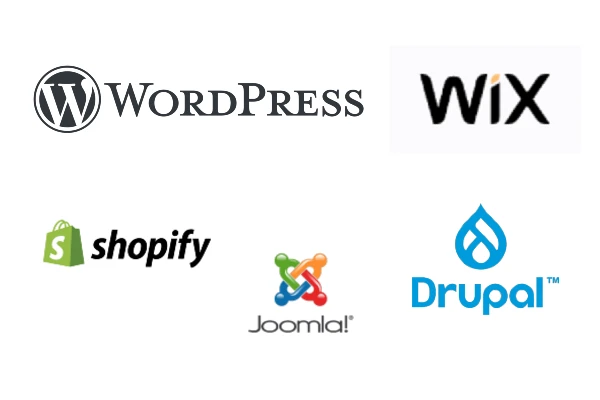
Choosing the right CMS depends on your website goals, technical skills, and scalability needs. Here’s a comparison of some of the most popular CMS platforms to help you decide:
1. WordPress.org
- Best for: Bloggers, small businesses, and even enterprise websites
- Pros: Highly flexible, thousands of themes and plugins, strong community support
- Cons: Requires hosting and regular maintenance
- Verdict: The world’s most widely used CMS – versatile enough to power any type of website.
2. Wix
- Best for: Beginners and small businesses
- Pros: Drag-and-drop builder, hosting included, no coding needed
- Cons: Limited flexibility compared to open-source CMSs
- Verdict: Ideal for quick and simple websites with minimal hassle
3. Shopify
- Best for: eCommerce businesse
- Pros: All-in-one platform for selling online, built-in payment gateway, excellent support
- Cons: Monthly fees, limited customisation unless you pay for advanced plans
- Verdict: A top-tier option for building and managing online stores effortlessly.
4. Joomla
- Best for: Tech-savvy users and developers
- Pros: More built-in features than WordPress, strong content management
- Cons: Steeper learning curve, fewer themes
- Verdict: Good for complex websites with advanced user management needs
5. Drupal
- Best for: Large, complex websites and government portals
- Pros: Extremely secure, highly customizable, scalable
- Cons: Requires technical expertise
- Verdict: Powerful but not beginner-friendly
Each platform has its own strengths. Choose one based on your content goals, team capabilities, and future growth plans.
How to Choose the Right CMS for You?

Selecting the right Content Management System (CMS) can significantly boost your website’s performance. With so many options available, it can be overwhelming. Here’s a step-by-step guide to help you choose the best CMS for your needs:
1. Understand Your Website’s Purpose
Identify whether you’re building a blog, eCommerce site, portfolio, or corporate site.
Different CMS platforms cater to different needs, so knowing your goals helps narrow down your choices.
2. Assess Your Technical Skills
If you’re a beginner with limited technical knowledge, look for a CMS with a user-friendly interface and drag-and-drop features, like Wix or Squarespace.
For more advanced users or developers, platforms like WordPress.org or Joomla offer greater flexibility but require more technical expertise.
3. Consider Customization and Flexibility
Do you need a highly customizable website? Choose platforms like WordPress or Drupal, which allow for detailed customization through themes and plugins.
If you’re looking for something quicker to set up, Wix and Shopify are great choices for simplicity.
4. Budget and Scalability
Some CMS platforms, such as Shopify, charge monthly fees, while others like WordPress are free but require separate hosting.
Consider your future growth. Can the CMS scale with your business? Platforms like WordPress and Drupal are ideal for scaling as your website grows.
5. Security and Support
Look for a CMS that offers regular updates, security patches, and strong community support. WordPress and Shopify excel in this area, offering extensive documentation and active support.
Choosing the right CMS involves balancing ease of use, customization, budget, and scalability based on your website’s needs.
CMS Comparison Table
| Feature / CMS | WordPress | Shopify | Wix | Joomla | Drupal |
|---|---|---|---|---|---|
| Coding Required | ✗ | ✗ | ✗ | ✗ | ✓ |
| eCommerce Ready | (with Woo) | ✓ | ✓ | ✓ | ✓ |
| SEO Tools | ✓ | ✓ | ✓ | ✓ | ✓ |
| Customization | ☆☆☆☆☆ | ☆☆ | ☆☆ | ☆☆☆ | ☆☆☆☆ |
| Ease of Use | ☆☆☆☆ | ☆☆☆☆ | ☆☆☆☆ | ☆☆ | ☆ |
What Fifth Shield Suggests?
At Fifth Shield, we highly recommend WordPress as the best CMS for most users. Its user-friendly interface, flexibility, and wide range of plugins make it ideal for businesses, bloggers, and eCommerce websites alike.
With a vast community offering support, constant updates, and a plethora of customizable themes, WordPress remains the top choice for anyone looking to build a professional and scalable website.
As the best website designing company in Delhi, Fifth Shield excels in creating stunning, high-performing WordPress websites tailored to your needs.
Our expert team ensures that your website is not only visually appealing but also optimized for SEO, speed, and user experience. Let us help bring your website vision to life with WordPress!
Wrapping Up
A CMS is a vital solution for efficiently managing and updating websites. WordPress stands out as the top choice due to its ease of use, customization options, and robust plugin support.
Whether you’re running a blog, eCommerce store, or portfolio, selecting the right CMS is crucial for success. Consider your needs, technical skills, and long-term goals to ensure the CMS you choose can grow with your website.
Don’t Miss: Top 10 SEO Mistakes That Are Hurting Your Website Ranking

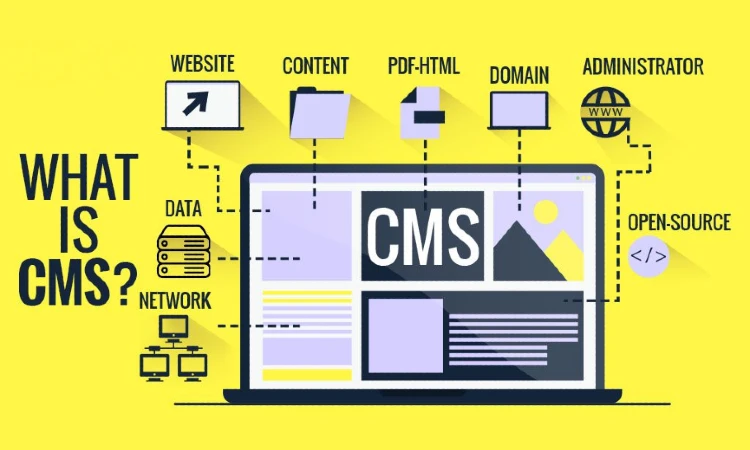





Write a Comment